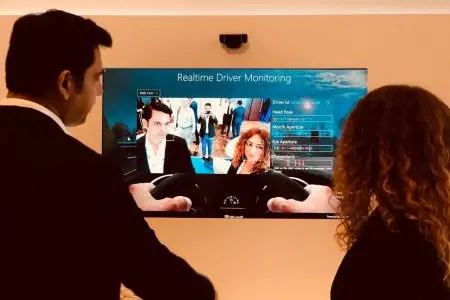PHOTO
- First edition of event occurs as regional firms increasingly look to smart solutions as a means to engage, empower, optimise and transform
- ‘The choices we make now, as governments, businesses and individuals, will determine our place in the digital future’, says Microsoft Gulf Cloud and Enterprise Group Lead
Dubai, United Arab Emirates – Microsoft this week joined a host of futurists, technology strategists, start-ups and investors from across the region and around the world, for the inaugural AI Week Middle East.
Endorsed by the Dubai Municipality and supported by the UAE Ministry of Health as Healthcare host partner, the event takes place during 4th and 5th September at the Park Hyatt, and dives deep into the field of artificial intelligence, focusing primarily on the government, healthcare and financial services sectors. Microsoft serves as Strategic AI Partner for AI Week Middle East 2018, operating a booth in the exhibition area, delivering keynotes and participating in panel discussions.
AI Week’s launch coincides with a rapid rise in regionwide adoption rates for AI-based solutions. In a Microsoft survey conducted recently, 29% of enterprise-scale Gulf businesses said they were investigating AI adoption as a means to accelerate digital transformation within their organisations. Specific smart technologies that were also under consideration by respondents were business intelligence (41%), Internet of Things (37%), automated workflow (25%) and predictive analytics (21%). And almost one in seven (14%) enterprises regarded robotics and machine automation as priorities.
“AI Week is the perfect platform, both for companies that are new to AI and for those that have solutions already in place,” said Necip Ozyucel, Cloud and Enterprise Group Lead, Microsoft Gulf. “Newcomers get to explore and assess technologies for best-fit and consult with proven industry experts. AI-equipped companies get to review the direction they have taken in the context of other case studies, and consider their next steps. We are now living through the societal tipping-point of the Fourth Industrial Revolution. The choices we make now, as governments, businesses and individuals, will determine our place in the digital future. The intelligent cloud and the intelligent edge form the fulcrum of digital transformation – the ability to engage citizens, patients and customers; the ability to empower employees; the ability to optimise operations; and the ability to reinvigorate entire business models. AI is the natural biproduct of that fulcrum.”
Rima Semaan, Data & Artificial Intelligence Technology at Microsoft Gulf, conducted a plenary session at the event to explain Microsoft’s overall vision, strategy and ethics framework concerning AI. She addressed the democratisation and operational applications of artificial intelligence, covering how smart solutions will augment human capabilities in the transformation of industries such as banking, government, retail, aviation, transportation and telecommunications.
Yousef El-Foudeh, Digital Advisor at Microsoft Gulf, delivered a talk on transforming financial services using AI. He explained the way AI is impacting the financial industry and how banks and insurance companies have reacted to this disruptive technology such as customer analytics, conversation agents, intelligent apps, fraud detection and financial forecasting.
Khaled El Shabrawy, Public Sector Cloud Solutions Lead and Account Technology Strategist at Microsoft Gulf, took part in the panel discussion “How do we govern AI?”, which explored AI governance with stress on the need to develop and apply AI ethics and standards when training machines, to make sure it is utilized for the good of humanity, rather than being harmful.
Meanwhile, at the AI Week, delegates saw the company’s various Azure-based AI platforms in action at the Microsoft booth. Microsoft experts demonstrated various Cognitive capabilities of Microsoft AI platform through industry-specific use cases from face-recognition to chatbots, and emotion detection to object analysis.
-Ends-
About Microsoft Gulf
Microsoft (Nasdaq “MSFT” @microsoft) enables digital transformation for the era of an intelligent cloud and an intelligent edge. Its mission is to empower every person and every organization on the planet to achieve more. Microsoft Gulf opened its Dubai-based headquarters in 1991. Today, the Gulf office oversees Microsoft Gulf activities in Bahrain, Kuwait, Oman, Qatar and UAE. More information can be found here: https://www.microsoft.com/en-gulf/
For more information (Press only):
Hassan Al Shouli , Microsoft Gulf
E : alshouli@microsoft.com
T: +971 50 934 0133
Windalyn Goma, ProGlobal Media
T: +971 54 526 1236
© Press Release 2018Disclaimer: The contents of this press release was provided from an external third party provider. This website is not responsible for, and does not control, such external content. This content is provided on an “as is” and “as available” basis and has not been edited in any way. Neither this website nor our affiliates guarantee the accuracy of or endorse the views or opinions expressed in this press release.
The press release is provided for informational purposes only. The content does not provide tax, legal or investment advice or opinion regarding the suitability, value or profitability of any particular security, portfolio or investment strategy. Neither this website nor our affiliates shall be liable for any errors or inaccuracies in the content, or for any actions taken by you in reliance thereon. You expressly agree that your use of the information within this article is at your sole risk.
To the fullest extent permitted by applicable law, this website, its parent company, its subsidiaries, its affiliates and the respective shareholders, directors, officers, employees, agents, advertisers, content providers and licensors will not be liable (jointly or severally) to you for any direct, indirect, consequential, special, incidental, punitive or exemplary damages, including without limitation, lost profits, lost savings and lost revenues, whether in negligence, tort, contract or any other theory of liability, even if the parties have been advised of the possibility or could have foreseen any such damages.




















